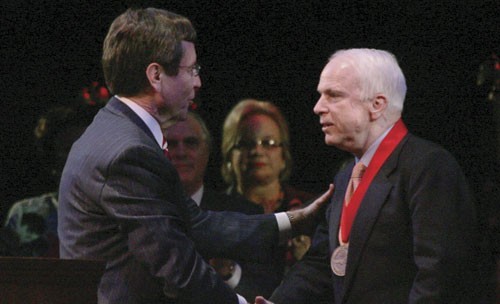
McCain receives Medal of Freedom (Photo by John Schreiber, The Daily Campus)
Sen. John McCain received the John Goodwin Tower Center Medal of Freedom Monday in a ceremony at McFarlin Auditorium.
The Arizona senator is the fifth recipient of the award, which is named after Texas’ first elected Republican senator.
Before McCain spoke, Sen. Kay Bailey Hutchison gave an introduction.
Hutchison joked that McCain has become a regular on the late night talk shows.
“Some say he aspires to be president, but they would be wrong – he just wants to host next year’s Academy Awards,” Hutchison said.
She went on to say that McCain is a “leading voice” on foreign policy in the Senate, mentioning his loyalty to friends and his staunch independence on certain issues.
Hutchison also mentioned his time served in Vietnam, saying that his service “continues to remind people of the sacrifices of those who have served.”
When Hutchison concluded, SMU President R. Gerald Turner presented McCain with the medal.
McCain took the podium and spoke for about 20 minutes about freedom and the United States’ role around the world, but he first acknowledged the man he called his mentor.
“Without him [Tower], my career might not have happened,” McCain said.
Tower endorsed McCain in his initial Republican primary – the first and only time Tower ever did so. McCain credited him for providing the necessary support and help in fundraising for winning the race.
“He thought the purpose of political advancement was to be a statesman – he was wise about the use of American power to spread our influence,” McCain said.
McCain told a story of a trip he and Tower took to Oman in 1979. The sultan set up camp in the desert and invited Tower and some friends to come visit him. When they entered the tents, everyone sat down cross-legged except for McCain.
“I couldn’t do that due to injuries from my time as a POW – so I wound up sitting with legs sticking straight at the sultan,” McCain said.
Showing one’s bare feet and soles is disrespectful in the country, so Tower wound up having to rescue McCain by quickly explaining why he was sitting that way.
“The Sultan understood, but after that John never let me hear the end of it – he would always say how he had to save me in the desert,” McCain said.
McCain then moved into a discussion of human rights and spreading democracy.
He said it’s easy to be skeptical, but that people – no matter where – share a basic desire to be free.
“It’s in the security interests of the U.S. that we should do all we can to promote the rights of those who live in regimes that do not,” McCain said.
He mentioned that human rights are not an invention of the west but are universal. He said the genesis of these rights lie in the human spirit.
“Injustice and tyranny should be upsetting to Americans, whether it’s at home or abroad,” he said.
Throughout the Cold War, McCain said, the United States condemned human rights abuses. As a result, some of the former eastern bloc countries are now part of the coalition in Iraq and Afghanistan.
He also emphasized the responsibility he believes the United States has as the world’s lone superpower.
“In the past, other states have combined to limit the influence of the lone power – that hasn’t happened with the U.S. since the fall of the Soviet Union,” McCain said. “This is a great opportunity.”
He mentioned that America’s moral standard is tied to the ability to remain a preeminent power, saying, “soft power is the power of attraction.” The attractive nature of the American way of life helped in the Cold War, according to McCain.
He said recent failures, such as the Abu Graib prison scandal, have set back U.S. foreign policy around the world.
“We must use the power we have to promote the concepts we hold dear,” he said.








